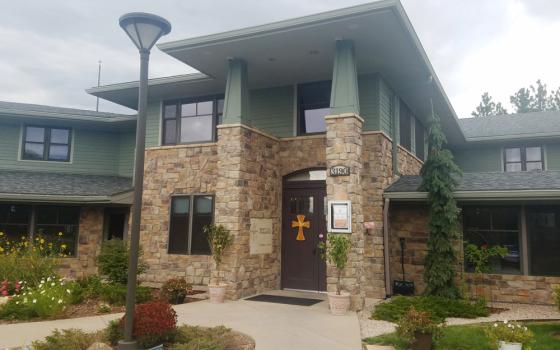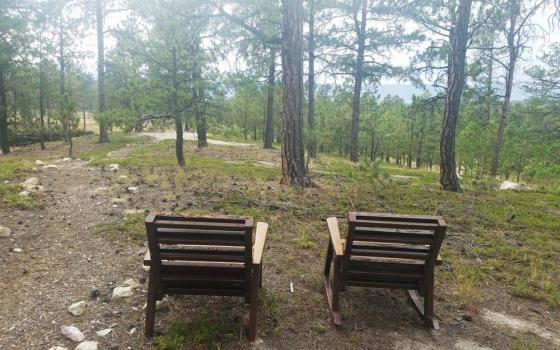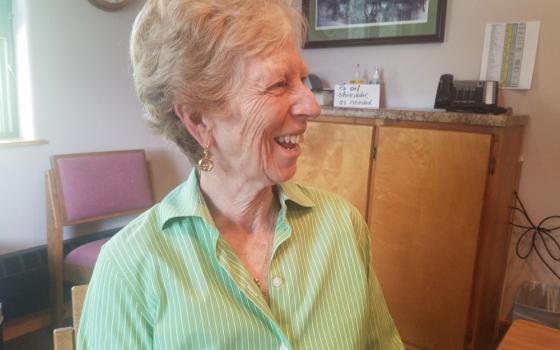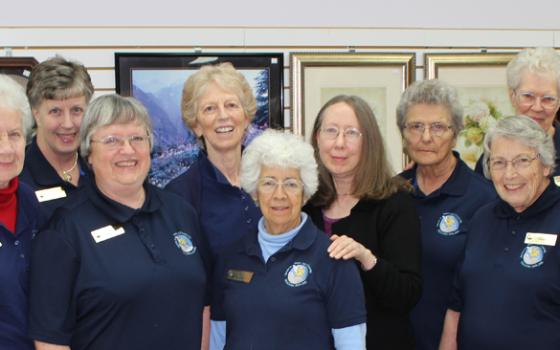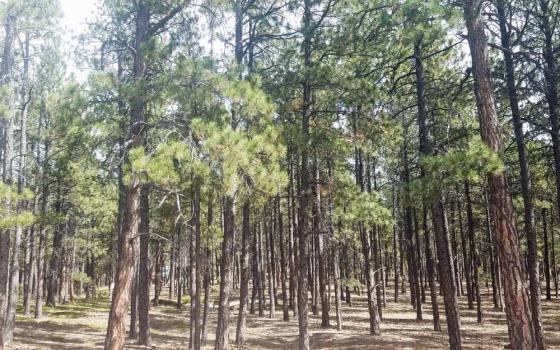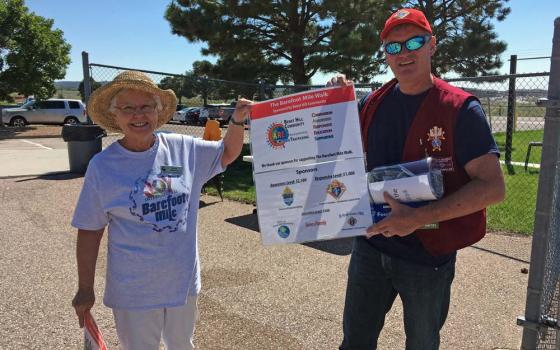The northern outskirts of Colorado Springs, Colorado, is dotted with acres of ponderosa pines, a quiet, peaceful locale befitting a group of Benedictine sisters embracing the contemplative life.
"This forest here is such a healing space," said Sr. Rose Ann Barmann, former prioress of the Sisters of Benet Hill Monastery.
When the Benet Hill congregation engaged in a process of discernment more than a decade ago about what to do about their future, its members decided to build a monastery on this pine-filled land. It is a decision he sisters do not regret, one that puts them on a path to further planting Benedictine values in Colorado's second-largest city, hoping to ensure their charism lives on after they are gone.
But the values the sisters affirm are not only contemplative, the sisters say. The congregation combines a monastic community life with a robust role in Colorado Springs' civic life, including advocating against human trafficking, having their monastery serve as a place of learning and spiritual retreats, and developing a thrift shop off-site that raises money for retired sisters while raising the sisters' visibility in Colorado Springs.
"We are contemplative but active at the same time," said Barmann, who heads the congregation's anti-human-trafficking ministry and was the congregation's prioress from 1999 to 2005.
Affirming a long Benedictine tradition of "contemplation leading to action," Barmann said the sisters' ministry "combines the best of two worlds," noting the Benedictine charism of hospitality has a wide meaning.
In making the decision to turn the monastery into a retreat and education center, the sisters knew the future did not hold a clear, singular path. The oldest sister in the congregation is 89, and the youngest is 56. In the next 10 to 15 years, "we'll probably be down to about 15 sisters" from the 30 sisters in the community today, said prioress Sr. Clare Carr, 68, who took her vows at age 26 and is now in her second term as prioress.
"It's confronting our reality," Carr said about the future. "It's not been easy ... there is a sense of grieving."
"But we're not despairing," she added, noting that in her first term as prioress from 2011 to 2017, three sisters took final professions and another took first vows.
Carr and others in the congregation are fond of a quote by Sr. Liguori Sullivan, the congregation's founding prioress: "By remaining true to the charism of the past but living in the present, we make the changes which have the life of the future embedded in them."
In that spirit, Carr, like other congregational members, said she is focused less on the distant future than on the immediate possibilities for continued ministry.
In a July public ceremony, the congregation celebrated and affirmed its more than 60 lay oblates, a public commitment among both female and male laity to a daily practice of prayer "and to bring about the Benedictine spirit of hospitality, unconditional love and acceptance of all into the world," wrote oblate novice Vincent Crowder in the congregation's most recent newsletter.
A consistent thread: education
For nearly 40 years, the sisters have run a program educating those who want to provide Benedictine spiritual direction — including therapists, clergy and lay spiritual seekers — that today draws students from different faith traditions who live in 20 states and in Kenya, Australia and New Zealand.
A consistent thread for the congregation's history is education, and the program continues to be an important part of that tradition, Carr said.
A stronger online presence has evolved in recent years because fewer students can make the commitment to do on-site course work at the monastery, said Sr. Mary Colleen Schwarz, who directs the program. Now, the two-year program, which nearly 800 students have completed since its start, will be going fully online; a revised curriculum divided into monthly instructional modules begins in January.
It was not easy for the sisters offering instruction to make the transition to a completely online format, Schwarz said, because of initial discomfort with the latest online technologies.
"But it's the way of the future, and it can be done," she said.
"They're not sitting around being 'retired,' " said Gina Berger, the monastery's communications director and a 2006 graduate of the spiritual direction program. "[The sisters] are keeping up with communication technologies."
Other forms of adult education also are important for the congregation: The Rocky Mountain Women's Film Institute holds a free film series at the monastery; the musicians of the Colorado Springs Chamber Orchestra offer concerts; and the monastery presents classes on church history, interfaith relations, mysticism, contemplative prayer, and prayers of welcome and forgiveness, as well as Benedictine spirituality. The monastery also hosts a weekly Sunday Mass.
In all, the monastery hosted 474 people on retreats in 2017 and offered programs in some way for about 1,700 people, Berger said.
The sisters have also welcomed anthropology and church history students from nearby Colorado College, a private liberal arts institution. One group studying ancient and monastic food prepared a meal in the style of the sixth century.
The educational ties continue a long tradition for the sisters, who have deep roots in the American West.
Benedictine Sisters of Mount St. Scholastica came from Atchison, Kansas, to Walsenburg in south-central Colorado in 1914 as teachers in parochial and public schools. They later expanded their work to the San Luis Valley, an area with some of Colorado's most majestic mountains that has long struggled economically.
Throughout the 20th century, the Benedictine sisters in the area continued to focus on teaching, and in 1959, the sisters purchased land for what would become the first Benet Hill Monastery in Colorado Springs.
In 1963, the sisters opened Benet Hill Academy, a girls' college preparatory school in Colorado Springs, and two years later became independent and took on the congregational name the Sisters of Benet Hill Monastery.
In 1966, the sisters purchased the 44-acre Benet Pines property, first for a cemetery and later for retreats. By the 1980s, the Benet Pines area on the northern outskirts of Colorado Springs had evolved more fully into a retreat center. When Benet Hill Academy closed in 1982, the school's property in the city center became an adult formation center.
Eventually, the sisters decided to consolidate most of their work in a new monastery on the Benet Pines property, selling the property in the city center that used to house Benet Hill Academy. The new monastery was completed in 2009 and is now home for most of the congregation's 30 members and serves as a retreat and education center for visitors.
The rising priority of anti-trafficking efforts
Both on- and off-site, the sisters also work with the community to combat human trafficking, a concern in Colorado Springs, which is about halfway along a much-traveled corridor of the north-south Interstate 25 that stretches along Colorado's Front Range of mountains.
Barmann said increasing awareness about human trafficking — those exploited for sexual purposes as well as for forced labor — prompted her to become active on the issue.
Though the monastery is not a safe house, the sisters welcome as visitors those who have been trafficked. The monastery has also served as a locale for public presentations about human trafficking.
The sisters are also active in other community projects focused on anti-trafficking efforts, including partnering with other local groups like the Knights of Columbus chapter for a recent Barefoot Mile Walk that raised money for local anti-trafficking work under the aegis of Joy International, a global anti-trafficking organization.
"I call it a life issue," Barmann said, adding that her goal is "to create a collaboration with all churches and congregations" in Colorado Springs on the issue. As part of that effort, Barmann is working with other groups, including Catholic and Episcopal parishes, to establish a local residence for traffic survivors, though that is not an official Benet Hill ministry.
Community-based activism is vital to the congregation's work in Colorado Springs, though to former prioress Sr. Naomi Rosenberger, whose ministry included 16 years as a missionary, mainly stints in Jamaica, the congregation now seems more monastic, which she says is due to the congregation having settled into the rhythms of life in a bucolic setting.
But it's not just the sense of closeness to nature that is important, Rosenberger said.
"The peace and the experience [you] find here grows out of the way we are," she said. "We're small but mighty."
[Chris Herlinger is GSR international correspondent. His email address is [email protected].]
